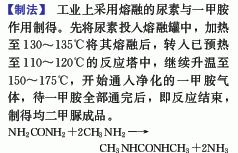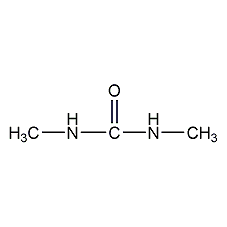1,3-Dimethylurea 1,3-Dimethylurea


Structural formula
| Business number | 02AX |
|---|---|
| Molecular formula | C3H8N2O |
| Molecular weight | 88.11 |
| label |
N,N’-Dimethylurea, N,N′-Dimethylurea, (CH3NH)2CO |
Numbering system
CAS number:96-31-1
MDL number:MFCD00008286
EINECS number:202-498-7
RTECS number:YS9868000
BRN number:1740672
PubChem ID:None
Physical property data
1. Character: white crystal
2. Density (g/mL, 20℃): 1.142
3. Relative vapor density (g/mL, air=1) : Undetermined
4. Melting point (ºC): 106
5. Boiling point (ºC, normal pressure): 268-270
6. Boiling point (ºC , kPa): Not determined
7. Refractive index: Not determined
8. Flash point (ºC): 157
9. Specific rotation (º ): Undetermined
10. Autoignition point or ignition temperature (ºC): Undetermined
11. Vapor pressure (mmHg,ºC): Undetermined
12. Saturated vapor pressure (kPa, ºC): Undetermined
13. Heat of combustion (KJ/mol): Undetermined
14. Critical temperature (ºC): Undetermined
15. Critical pressure (KPa): Undetermined
16. Log value of oil-water (octanol/water) partition coefficient: Undetermined
17. Explosion upper limit (%, V/V): Undetermined
18. Explosion lower limit (%, V/V): Undetermined
19. Solubility: soluble in water, ethanol , acetone, benzene and ethyl acetate, etc., are insoluble in ether and gasoline.
Toxicological data
1. Acute toxicity: rat LD50: >2mg/kg; mouse intraperitoneal LDLo: 4962mg/kg;
2. Reproductive toxicity
Rat oral TDLo : 2mg/kg (12 days after conception in female rats); Oral TDLo in mice: 2mg/kg (10 days after conception in female rats);
3. Mutagenicity
Chlamydia Gene mutation: 400mmol/L;
DNA suppression of human lymphocytes: 40mmol/L;
Ecological data
General remarks
Water hazard class 1 (German regulations) (self-assessment via list) The substance is slightly hazardous to water.
Do not allow undiluted or large amounts of product to come into contact with groundwater, waterways or sewage systems.
Even extremely small amounts of product seeping into the ground can pose a hazard to drinking water
Do not discharge materials into the surrounding environment without government permission.
Molecular structure data
1. Molar refractive index: 23.16
2. Molar volume (cm3/mol): 92.8
3. Isotonic specific volume (90.2K ): 212.4
4. Surface tension (dyne/cm): 27.4
5. Polarizability (10-24cm3): 9.18
Compute chemical data
1. Reference value for hydrophobic parameter calculation (XlogP): None
2. Number of hydrogen bond donors: 2
3. Number of hydrogen bond acceptors: 1
4. Number of rotatable chemical bonds: 0
5. Number of tautomers: 2
6. Topological molecule polar surface area 41.1
7. Number of heavy atoms: 6
8. Surface charge: 0
9. Complexity: 46.8
10. Number of isotope atoms: 0
11. Determine the number of atomic stereocenters: 0
12. Uncertain number of atomic stereocenters: 0
13. Determine the number of chemical bond stereocenters: 0
14. Number of uncertain chemical bond stereocenters: 0
15. Number of covalent bond units: 1
Properties and stability
1. Avoid contact with oxides.
2.This product is slightly toxic. Packed in paper bags, 45kg per bag. Store and transport as general chemicals.
Storage method
Store in a cool, ventilated warehouse. Keep away from fire and heat sources. Keep container tightly sealed. should be kept away from oxidizer, do not store together. Equipped with the appropriate variety and quantity of fire equipment. The storage area should be equipped with emergency release equipment and suitable containment materials.
Synthesis method

Purpose
Pharmaceutical intermediates, also used in the production of fiber treatment agents. It is used in medicine to synthesize theophylline, caffeine and nifekaran hydrochloride.
